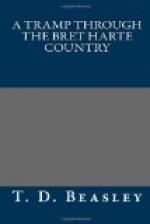Indeed, one glance at Mr. Bradley is enough to convince you that he is a man of unusual force of character. No one introduced me to him. I was merely informed at the Cary House that he was the person to whom I should apply for information concerning the old times. I accordingly started out to look for him and had not proceeded fifty yards when a man, approaching at a distance, arrested my attention. As he drew nearer, I felt positive there could be only one such personage in Placerville, and when he was opposite me, I stopped and said, “How are you, Mr. Bradley?” “That’s my name, sir; what do you want?” he replied.
They take life easily in the old mining towns. No wonder the spectacle of a man with a pack on his back caused comment, in that heat, tramping two or three hundred miles for pleasure! Beyond the trivial necessities that bare existence makes imperative, I was not conscious of seeing anyone do anything on the whole trip. Old miners not unnaturally took me for a prospector, and I think I never quite succeeded in convincing them to the contrary.
In Placerville as in Angel’s Camp, the evening promenade seems the most important event of the day. Young men and maidens pass and repass in an apparently endless chain. The same faces recur so frequently that one begins to take an interest in the little comedy and speculate on the rival attractions of blonde and brunette, and wonder which of the young bloods is the local Beau Brummel. The audience — so to speak — sit on, chairs backed against the walls of the hotels and stores, while many prefer the street itself, and with feet on curb or other coign of vantage, tilt their chairs at most alarming angles. A sort of animated lovers’ lane is thus formed, through which the promenaders have to run the gauntlet, and are subjected to a certain amount of criticism. Everyone knows everyone. Good natured badinage plays like wild-fire, up and down and across the street. Later on, the tinkle of mandolin and guitar is heard far into the night watches.
Having determined to reach Auburn — thirty miles away — the next day, I made an early start. Coloma lies at the bottom of the great canon of the South Fork of the American River. Hastening down the grade, in a bend of the road I almost ran into my friend. It seemed a strange meeting this, in the heart of the old mining country, and I think we both gave a perceptible start.
It was at Coloma that gold was first discovered in California, by James W. Marshall, January 19, 1848. My companion had been so fortunate on the previous day as to meet Mr. W. H. Hooper, who arrived in Coloma August 8, 1850, and who has lived there practically ever since. Though eighty-three, he is still strong and vigorous. From him my friend elicited some very interesting information in regard to Marshall especially, the substance of which I append from his notes. Mr. Hooper had known Marshall for many years, and his reminiscences of the discoverer have a touch of pathos bordering on the tragic.




